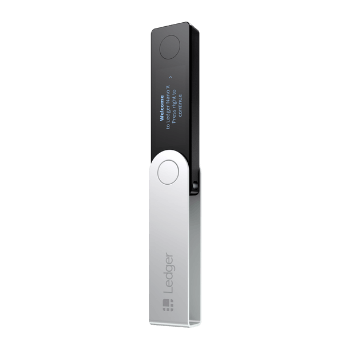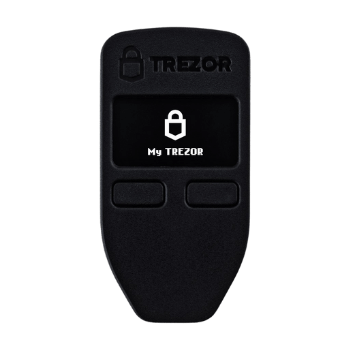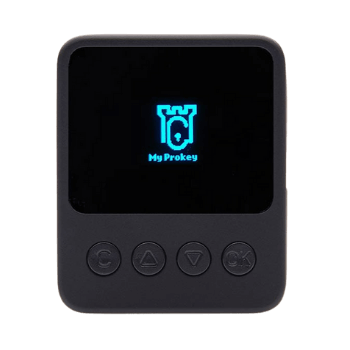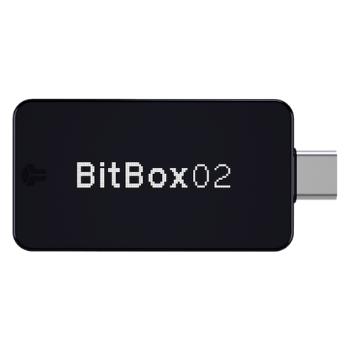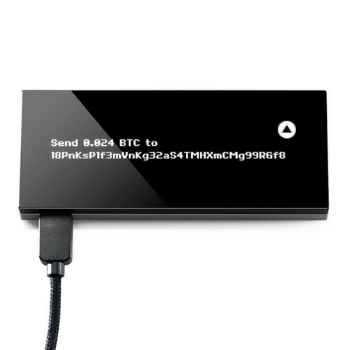Best Crypto Wallets of 2022
Choosing the right wallet to store your cryptocurrency is essential in today's world. Our best crypto wallets have been carefully reviewed and we are confident that these are the most secure wallets on the market.
Best Hardware Wallets
Best Desktop Wallets
Best Mobile Wallets
Best Web Wallets
What is a Cryptocurrency Wallet?
A crypto wallet is a software that maintains the public and private keys and interacts with different blockchains to allow users to transfer and receive digital money while keeping track of their balance.
If you have the prospects of utilizing Bitcoin or any other cryptocurrency, you will need a digital cryptocurrency wallet.
How do the Crypto Wallets Work?
While millions of people use cryptocurrencies every day, there is still confusion surrounding how these crypto wallets function.
Digital wallets, unlike traditional 'pocket' wallets, do not store currency. In truth, currencies do not exist physically and are not stored in any single location.
The only thing that exists is transaction records kept on the blockchain.
Cryptocurrency wallets are like computer programs that store your private and public keys and connect to different blockchains.
That allows you to check your balance, send money, and do other things.
When someone sends you bitcoins or any other digital currency, they effectively transfer ownership of the coins to your wallet's address.
The private key stored in your wallet must match the public address the currency is linked to spend those coins and release the cash.
The balance in your digital wallet will increase if the public and private keys match, and the senders will drop appropriately.
There is no physical exchange of money.
A transaction record on the blockchain and a change in balance in your bitcoin wallet is all that is required to complete the transaction.
What are the Different Types of Crypto Wallets?
Cryptocurrency wallets are available in various formats, each with its own set of advantages and disadvantages in terms of trading convenience and security.
But, regardless of the format, security starts with you making sure the passwords you use to access your digital wallet are secure.
That said, there are two major types of crypto wallets: Hot storage or cold storage wallets.
Hot Storage/Online Wallets
Cryptocurrency wallets, such as phone apps, desktop software applications, or online providers, are all directly connected to the internet (thus the term "hot" storage).
The good thing is that these services are all available for free.
The harsh reality is that as they're all connected to the internet, they all pose a security concern and are possibly vulnerable to online theft.
Although crypto theft keeps hitting the headlines, the reality is that cryptocurrency exchanges and crypto wallet providers appear to be improving their anti-crypto crime capabilities.
Despite the success of cryptocurrencies, according to a report by CipherTrace, a blockchain security and analytics startup, bitcoin theft plummeted 57 percent in 2020.
For that reason, you still need to ultimately take care of your crypto wallets, just like the wallet in your pocket and remember that the digital currencies in your digital wallet are also a target for thieves.
That said, let's take a look at the different hot storage crypto wallets.
- Web Wallets
Web wallets can be used on both your mobile and desktop devices.
They provide browser-based wallets, but they do not have total control over the traditional desktop or mobile wallets.
Web-based wallets are available from exchanges like Coinbase and brokerages like Robinhood that provide cryptocurrencies.
- Desktop Wallets
Desktop wallets are applications that run on your PC and hold all of your cryptocurrencies.
The benefit of a desktop wallet is that you have complete control over your assets, so you won't have to worry about a third party freezing or losing your money.
However, security is also your duty, so you'll need to secure and back up your wallet, as well as ensure that your computer is malware-free.
Some of the common examples of desktop wallets include; Exodus, Electrum and Guarda.
- Mobile Wallets
Mobile wallets are applications that allow you to store and manage your bitcoin funds on your smartphone.
For face-to-face payments and the use of QR codes to facilitate quick purchases, mobile wallets for iOS and Android operating systems are the handiest.
You'll be responsible for backing up your device, just like with desktop wallets, to protect your digital cash from damage, theft, or loss.
Cold Storage/Offline Wallets
Cold storage wallets vary from software wallets such that they keep a user's private keys on a physical device, such as a USB drive.
Even though hardware wallets conduct transactions online, they are stored offline, providing additional security.
Hardware wallets can work with various web interfaces and support various currencies, depending on which one you choose.
Furthermore, completing a transaction is simple.
Users connect their device to any computer or device with an internet connection, enter a pin, transmit currency, and confirm.
Hardware wallets let you quickly transact while keeping your funds offline and out of harm's way.
- Paper Wallets
Paper wallets are the easiest to use as they offer users a higher level of protection.
To most people, the term paper refers to the physical printout of the private and public keys.
However, in some cases, it could also mean software that generated both the private and public keys then securely prints them.
It's relatively easy to use a paper wallet.
You get your Bitcoin and the other cryptocurrencies by transferring the funds from your software to the public address indicated on the paper wallet.
If you want to withdraw or spend money, you can transfer monies from your paper wallet to your software wallet.
How to Choose the Best Crypto Wallet
Your cryptocurrency wallet is going to store and keep your coins safely in the long term.
For that reason, you must learn the main tips on choosing the best cryptocurrency wallet in the market.
With that said, let's dive right in!
- Examine the Company's Reputation
First things first, before anything else, it's critical to determine how long the service has been in operation, who runs it, and whether your data will be secure.
You should not utilize any wallet if they are unable to supply you with this information. It is usually advisable to choose recognized platforms.
The most crucial considerations that you need to pay attention to include; Who is the company's leader? (a group of experts), who has access to your wallet's private key, keeps data on their servers, dealings with historical development techniques, and how the data will be managed.
- Examine the Technologies they Employ
Now, this comes down to the transparency of the service provider.
For instance, third parties will review the code in the case of open-source wallets. Furthermore, it indicates that if something goes wrong, it will be publicly reported.
If you like a little anonymity and privacy, that will not be the wallet for you.
In fact, we can all agree that most people who use digital assets do not feel safe using such wallets.
Furthermore, it would help determine how your private keys will be stored and who will be in charge of, for example, ism. Is it you or the server?
- Check the Security Features of the Crypto Wallet
You may have considered investing in cryptocurrencies on different crypto wallet platforms, but security is a big concern.
Look for the following crucial security elements when determining whether or not the wallet you are considering is secure: Biometric authentication, which essentially is the method of verifying a person's identity.
Also, verify if the use of two factors for authentication and password protection features are in place.
Finally, you need to make sure that you can log off of a session in the most efficient manner feasible and the wallet can support multiple signatures.
- Ensure the Wallet is Compatible with Various Operating Systems
The best cryptocurrency wallets should be compatible with a wide range of devices. For example, white-label biting software is essential in creating Windows, iOS, Android, and Linux.
It's, therefore, more desirable when a crypto wallet is compatible with a range of operating systems as it's able to support as many users as possible.
That said, be sure to double-check that your cryptocurrency wallet is compatible with the hardware or software you're using.
This is something that you always need to take into consideration while selecting a cryptocurrency wallet.
However, you should not make your final decision based on this option, as other factors will influence your decision.
- Transparency is Key
A cryptocurrency wallet must be transparent about its offerings, methods of operation, and security standards.
Choose an open-source wallet since they provide the highest level of cryptocurrency security.
It's difficult to tell if a wallet is reliable if it isn't open source. Peer-reviewed open-source wallets provide the highest level of security.
Also, ensure sure the source code for the bitcoin wallet is up to date.
- The User's Anonymity
The majority of clients want a wallet that safeguards their personal information.
You must decide whether the wallet accepts only an email address or if additional sensitive data from users is necessary.
Check to determine if the wallet has a Know Your Customer (KYC) requirement.
These are crucial things you should look for and be aware of because user anonymity is quite crucial, and most users would not want to reveal personal details.
- The Shared Account Proceeds
If you share your wallet with someone else, you'll need confirmation from all individuals involved in a transaction.
Multi-Sig is a new feature that has lately surfaced. This feature allows users to create many private keys for a single wallet, ideal for business partners or families.
- The Available Backup Options
Another crucial thing you should look into is whether or not there is a reliable backup system in place.
It will assist you in regaining access if your computer or smartphone is damaged and all data is erased.
You will be able to utilize your money again in a short length of time, thanks to a software wallet with a good backup mechanism.
- Supported Cryptocurrencies
It would help if you also looked at the number of available cryptocurrencies.
Many wallets allow users to use multiple cryptocurrencies, so you should familiarize yourself with them.
- Currency Conversion
Many users will appreciate it if they can convert cryptocurrencies.
That said, make sure converting one crypto asset to another is simple if it's incorporated into your wallet, especially if you're using several different coins.
- Experience with the user interface
If you're new to cryptocurrency, you should choose a wallet with a user-friendly interface.
As a result, you can rest certain that using the app will be simple and that you will understand and use the wallet's functionalities without difficulty.
As a result, select a bitcoin wallet with a user-friendly interface.
- The Customer Service
It is critical to provide excellent customer service. Customer service is always important, regardless of which internet service you use.
There must be a team of professionals available to respond swiftly and assist you in resolving any issues that arise.
- The Multi-signature Feature
The most popular method of protecting bitcoins against attackers and hackers is to use a multi-signature option.
Because cryptocurrency transactions necessitate several keys, a wallet must support multi-signature.
Users must protect their multi-signature credentials, which are essential to complete transactions.
- A QR code is Required
If you're going to utilize a mobile wallet, this is a must-have function; a good one should create and read QR codes for transfers.
The best aspect is that you won't have to type in a long key when you use it, saving you time.
Frequently Asked Questions
Wrapping Up
As we all have seen from this article, there are many different crypto wallets in the market. I hope you now have a better idea of this article's best cryptocurrency wallets in each category.
Also, I bet you are now well informed of the basic tips on choosing the best cryptocurrency wallet. You must have a safe crypto wallet.
But that's not all; it also needs to be convenient and easy to use. For that reason, be sure to go through the available option in the market and see what best fits your needs before you proceed.
